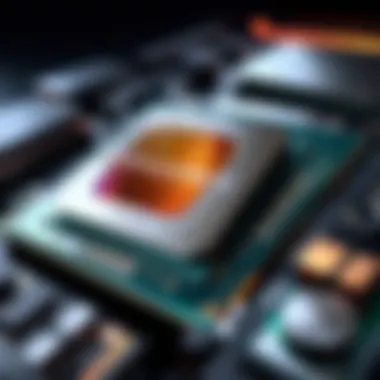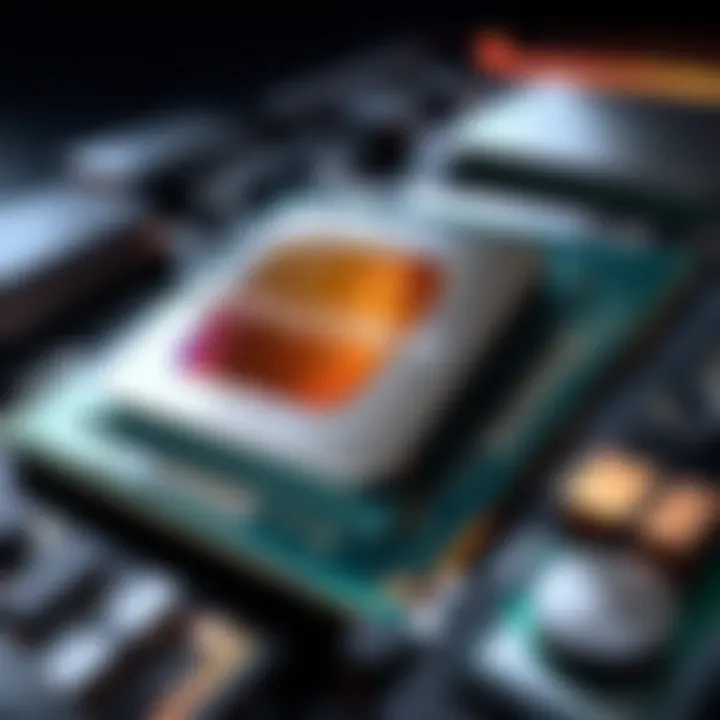AMD Ryzen 7 vs. Intel i7: A Detailed Comparison of Powerhouse Processors


Esports Coverage
When delving into the world of high-performance computing, the comparison between AMD Ryzen 7 and Intel i7 processors becomes paramount. Both AMD Ryzen 7 and Intel i7 processors are revered in the realm of Esports, where split-second decisions can mean the difference between victory and defeat. Tech enthusiasts and gamers are constantly seeking the ideal blend of processing power, energy efficiency, and multitasking capabilities to enhance their gaming experiences. This comprehensive comparison aims to unravel the distinct features and performance metrics of these two powerhouse CPU options, catering to the intensive demands of Esports competitions.
Pro-Gaming Tournaments
In the immersive realm of Esports, pro-gaming tournaments serve as arenas where elite gamers showcase their skills and strategies, often relying on the optimal performance of their CPUs to gain a competitive edge. Understanding how AMD Ryzen 7 and Intel i7 processors fare in these high-stakes environments provides valuable insights into their real-world efficacy and reliability. By scrutinizing their performance under the intense pressure of competitive gaming tournaments, tech enthusiasts can discern which processor aligns best with their gaming needs and preferences, be it seamless multitasking capabilities or high clock speeds for swift responsiveness.
Player Profiles and Interviews
Player profiles and interviews offer a nuanced perspective on how AMD Ryzen 7 and Intel i7 processors influence the gaming experiences of professional Esports players. Through candid discussions and in-depth conversations with elite gamers, the strengths and limitations of each processor in competitive gaming scenarios come to light. From addressing the impact of processor architecture on gameplay fluidity to exploring the nuances of overclocking potential, player profiles and interviews provide a window into the performance nuances that can shape the outcomes of Esports battles.
Team Strategies and Analysis
In the strategic landscape of Esports, team cohesion and performance optimization hinge on the seamless integration of hardware components, including CPUs. Analyzing the team strategies and equipment choices of renowned Esports teams sheds light on how AMD Ryzen 7 and Intel i7 processors contribute to strategic gameplay decisions. Comprehending the compatibility of these processors with varied gaming genres and playstyles can inform team dynamics, fostering a symbiotic relationship between hardware capabilities and tactical prowess on the virtual battlefield.
Introduction
In the realm of high-performance computing and gaming, a critical decision often faced by enthusiasts and professionals alike revolves around choosing between the formidable contenders - AMD Ryzen 7 and Intel i7 processors. This article embarks on a journey to dissect and compare these two technological powerhouses from various angles, shedding light on their nuanced architecture, performance metrics, and practical implications for users. By unraveling the intricacies of this comparison, readers, especially esports enthusiasts and tech aficionados, will gain invaluable insights to facilitate well-informed decisions when navigating the complex landscape of CPU selection.
Overview of AMR Ryzen
Diving into the nuances of AMD Ryzen 7, one encounters a marvel of engineering that exemplifies high-core counts and exceptional multi-threading performance. The Ryzen 7 series stands out for its prowess in handling resource-intensive tasks efficiently, making it a preferred choice for users who prioritize multitasking and content creation. Moreover, AMD's innovative approach to chip design, incorporating features such as Simultaneous Multi-Threading (SMT) and advanced cache management, ensures that Ryzen 7 processors deliver a potent mix of speed and responsiveness for a diverse array of computing demands.
Overview of Intel i7
On the opposing end of the spectrum lies Intel i7, a stalwart in the CPU domain renowned for its legacy of consistent performance and reliability. The Intel i7 processors are synonymous with unparalleled single-core performance, making them a top choice for tasks that hinge on raw computational speed, such as gaming and single-threaded applications. Additionally, Intel's optimization for instructions per clock (IPC) and robust software support further solidify the i7's position as a go-to option for users seeking sheer processing power and seamless operation in a variety of computing scenarios.
Architecture
In this article dissecting the comparison between AMD Ryzen 7 and Intel i7 processors, the architecture plays a pivotal role. The architecture forms the core foundation of these processors, determining their performance, efficiency, and capabilities. When discussing architecture, one must delve into the intricate design, structure, and arrangement of components within the CPU. Understanding the architecture is crucial as it directly influences how the processor functions, handles tasks, and manages resources efficiently, thereby affecting the overall user experience.
AMD Ryzen Architecture


Unveiling the AMD Ryzen 7 architecture is akin to unraveling a masterpiece of engineering. AMD's Zen architecture forms the backbone of Ryzen 7 processors, boasting a sophisticated design that integrates multiple cores and threads for unparalleled multi-tasking capabilities. The Zen microarchitecture is crafted with precision, ensuring optimal performance across a spectrum of applications, from gaming to content creation. The innovative Infinity Fabric interconnects play a crucial role in ensuring seamless communication between different core complexes within the processor, enhancing efficiency and responsiveness.
Intel i7 Architecture
On the opposite end, the Intel i7 architecture showcases the culmination of years of refinement and innovation. Intel's Skylake or Kaby Lake microarchitecture powers the i7 lineup, demonstrating formidable single-core performance and efficiency. The architecture emphasizes clock speed and IPC (Instructions Per Cycle), optimizing the processor for tasks that demand raw processing power. The Turbo Boost technology integrated into Intel i7 processors dynamically adjusts clock speeds to deliver enhanced performance when needed, catering to a diverse range of computing needs.
Performance Metrics
Performance metrics play a pivotal role in the comprehensive analysis of the AMD Ryzen 7 and Intel i7 processors. These metrics serve as key indicators of how these CPUs perform across various tasks and workloads. By dissecting the performance metrics, users can gain insights into the capabilities and limitations of each processor, aiding in decision-making processes. Understanding the nitty-gritty details of single-core, multi-core, and gaming performance metrics is essential to gauge the true potential of these powerhouse CPUs.
Single-Core Performance
Single-core performance is a vital aspect to consider when comparing the AMD Ryzen 7 and Intel i7 processors. It determines how efficiently a processor can handle tasks that rely on a single core. For applications that are not optimized for multi-core processing, single-core performance can significantly impact overall speed and responsiveness. Analyzing single-core performance gives users a peek into how well these CPUs handle day-to-day computing tasks and older applications that do not leverage multi-core architectures.
Multi-Core Performance
On the other hand, multi-core performance delves into the processing capabilities of multiple cores within the AMD Ryzen 7 and Intel i7 CPUs. Multithreaded applications and tasks that can leverage multiple cores benefit immensely from superior multi-core performance. Whether it's content creation, video rendering, or data-intensive activities, understanding how these CPUs tackle multi-core workloads is crucial. By examining multi-core performance metrics, users can discern the efficiency and scalability of these processors in handling demanding tasks efficiently.
Gaming Performance
Gaming performance holds significant weight for enthusiasts considering the AMD Ryzen 7 or Intel i7 processors. The ability to deliver smooth frame rates, minimize lags, and enhance overall gaming experience relies heavily on the gaming performance metrics of these CPUs. Factors like clock speeds, cache sizes, and architecture intricacies impact how well these processors handle the latest gaming titles. Evaluating gaming performance sheds light on the competitive edge these CPUs offer in the realm of gaming, providing gamers with insights into which processor aligns best with their gaming preferences and requirements.
Price-to-Performance Ratio
Price-to-Performance Ratio, a quintessential metric in the realm of CPU comparisons, holds paramount significance in discerning the true value offered by the AMD Ryzen 7 and Intel i7 processors. This crucial factor meticulously amalgamates the cost of the CPU with its overall performance prowess, enabling users to gauge the efficiency and worth of their investment. When delving into the Price-to-Performance Ratio aspect in this exhaustive comparison, it becomes evident that finding the delicate equilibrium between cost and capability is imperative for tech aficionados and gamers alike.
In scrutinizing the Price-to-Performance Ratio of AMD Ryzen 7 versus Intel i7, several specific elements come into play. The AMD Ryzen 7 series presents a compelling value proposition, with a judicious blend of advanced features and competitive pricing. On the other hand, Intel i7 processors, renowned for their formidable performance levels, often come with a premium price tag. Deciphering which CPU aligns best with individual budget constraints and performance requirements becomes a paramount consideration.
The benefits embedded within the concept of Price-to-Performance Ratio transcend mere monetary savings. Optimal utilization of financial resources leads to an enhanced user experience and productivity, elevating the overall satisfaction derived from the CPU investment. By meticulously evaluating this metric, users can make astute decisions that not only meet their computational needs but also offer long-term value and utility.
Amidst the deliberation surrounding the Price-to-Performance Ratio, users must navigate through various considerations. It is essential to conduct a comprehensive assessment of one's computing requirements, delineating between tasks that necessitate high processing power and those that prioritize budget sensitivity. Additionally, factoring in future upgradability and compatibility aspects enriches the decision-making process, ensuring a holistic evaluation of the CPU's long-term viability.
Overclocking Capabilities
In the realm of CPU comparison, understanding the overclocking capabilities plays a crucial role. Overclocking allows users to push their processors beyond factory settings, maximizing performance for tasks ranging from intensive gaming to complex simulations. This section will delve into the significance of overclocking capabilities in the context of comparing AMD Ryzen 7 and Intel i7 processors, highlighting the potential performance gains and considerations that come with overclocking.


AMD Ryzen Overclocking
When it comes to AMD Ryzen 7 processors, overclocking opens up a realm of possibilities for users seeking to extract greater performance from their systems. With unlocked multipliers and robust cooling solutions, AMD Ryzen 7 chips offer enthusiasts the chance to fine-tune their CPU frequencies, resulting in enhanced single-core and multi-core performance. However, overclocking Ryzen processors requires careful attention to voltage levels and thermal management to prevent instability or damage to the CPU. By exploring AMD Ryzen 7 overclocking capabilities, users can unleash the full potential of their processors for a tailored computing experience.
Intel i7 Overclocking
On the other side of the spectrum, Intel i7 processors also provide overclocking capabilities that cater to power users and overclocking enthusiasts. Intel's long-standing prowess in processor technology ensures that i7 chips deliver impressive overclocking headroom, allowing users to boost clock speeds for improved performance in demanding applications. Intel i7 overclocking entails adjusting multiplier ratios and voltages with precision to achieve stable overclocks without compromising system integrity. By examining Intel i7 overclocking features, users can leverage the inherent performance advantages of these CPUs to optimize their computing tasks with a strategic overclocking approach.
Power Efficiency
In this section, we delve into the critical aspect of power efficiency in the comparison between AMD Ryzen 7 and Intel i7 processors. Power efficiency holds immense importance in the realm of CPUs, affecting not only energy consumption but also heat dissipation and overall system stability. When evaluating power efficiency, specific elements must be considered to ensure optimal performance and longevity of the computing system. The benefits of prioritizing power efficiency include reduced electricity costs, less heat generation leading to improved system longevity, and a smaller carbon footprint due to lower energy consumption. Factors such as thermal design power (TDP), idle power consumption, and load power consumption play a crucial role in assessing the power efficiency of CPUs.
AMD Ryzen Power Consumption
As we focus on the power consumption of AMD Ryzen 7 processors, we find that AMD has made significant strides in improving the power efficiency of their CPUs. The Ryzen 7 series demonstrates impressive power management capabilities, balancing performance with energy consumption effectively. With advancements in core architecture and manufacturing processes, AMD Ryzen 7 processors exhibit competitive power consumption metrics, making them a compelling choice for users seeking high performance without compromising on efficiency. Achieving a fine balance between power draw and processing capabilities, AMD Ryzen 7 CPUs are well-suited for multitasking, gaming, and content creation while maintaining efficient power utilization.
Intel i7 Power Consumption
Shifting our focus to Intel i7 processors, we uncover the power consumption characteristics of these formidable CPUs. Intel's emphasis on power optimization has resulted in processors that deliver exceptional performance while keeping power requirements in check. Intel i7 CPUs excel in power efficiency, offering a blend of processing power and energy conservation. With advanced power management features and refined manufacturing techniques, Intel i7 processors showcase superior power efficiency across various workloads. Whether engaging in intensive gaming sessions or demanding productivity tasks, Intel i7 processors strike a balance between performance and power consumption, catering to users with diverse computational needs.
Integrated Graphics
Integrated graphics play a pivotal role in this comprehensive examination of AMD Ryzen 7 and Intel i7 processors. Unlike discrete graphics cards, integrated graphics are contained within the processor itself, providing a cost-effective solution for displaying visuals on a screen. While they may not offer the same performance as dedicated GPUs, integrated graphics are adequate for everyday computing tasks, multimedia consumption, and even light gaming.
AMD Ryzen Integrated GPU
When delving into the realm of AMD Ryzen 7 integrated GPU, one encounters the Radeon Vega Graphics that come built into select Ryzen 7 processors. These integrated graphics offer decent performance for casual gaming, video streaming, and content creation. With support for modern display connections and efficient power consumption, AMD's integrated GPUs are a bonus for users seeking a complete solution without the need for a separate graphics card.
Intel i7 Integrated GPU
Conversely, Intel i7 processors boast Intel UHD Graphics or Intel Iris Plus Graphics, depending on the specific model. While not as powerful as dedicated GPUs, Intel's integrated graphics excel in energy efficiency and compatibility with a wide range of software. They are suitable for business applications, multimedia playback, and entry-level gaming, striking a balance between performance and affordability.
Compatibility and Platform Support


In the realm of CPU selection, Compatibility and Platform Support play a critical role in determining the overall user experience and system performance. When conducting a thorough comparison between AMD Ryzen 7 and Intel i7 processors, delving into the aspects of Compatibility and Platform Support is essential. Compatibility refers to the ability of the CPU to seamlessly integrate with other system components such as motherboards and graphics cards, ensuring smooth operation without any hardware conflicts. On the other hand, Platform Support relates to the longevity and upgradability of the existing system, determining the extent to which new components and technologies can be incorporated into the setup. In this article, understanding the nuances of Compatibility and Platform Support between AMD Ryzen 7 and Intel i7 processors is crucial to help users make informed decisions based on their specific needs and future requirements.
AMD Ryzen Socket and Motherboard Compatibility
When evaluating AMD Ryzen 7 processors, it is imperative to consider the Socket compatibility and motherboard support to maximize the performance potential. The Ryzen 7 lineup typically utilizes the AM4 socket, offering a broad range of motherboard options from various manufacturers. The AM4 socket provides compatibility with different chipset configurations, catering to diverse user preferences ranging from budget builds to high-end systems. Additionally, AMD's commitment to socket AM4 longevity ensures users can benefit from continuous platform support and compatibility for future Ryzen generations. By assessing the AMD Ryzen 7 Socket and Motherboard Compatibility, users can tailor their system setup according to their desired performance levels and feature requirements, ensuring a seamless computing experience.
Intel i7 Socket and Motherboard Compatibility
In the case of Intel i7 processors, Socket and Motherboard Compatibility are crucial factors influencing the overall system configuration and flexibility. Intel's i7 lineup typically utilizes sockets such as LGA 1151 or more recent variants like LGA 1200, depending on the processor generation. These sockets dictate the motherboard compatibility, with each socket supporting specific chipset and memory configurations. It is essential for users considering Intel i7 processors to verify the socket and motherboard compatibility to ensure optimal performance and feature utilization. Intel's approach to socket upgrades may vary between processor generations, necessitating thorough research to align the CPU with a compatible motherboard for a stable and future-proof system setup. By evaluating the Intel i7 Socket and Motherboard Compatibility, users can strategize their hardware investments effectively and capitalize on the full potential of their Intel-powered systems.
Future Upgrade Path
In this section of the article about comparing AMD Ryzen 7 versus Intel i7 processors, we delve into the crucial aspect of the future upgrade path. Understanding the potential for upgrading your CPU is paramount in the ever-evolving landscape of technology. The future upgrade path not only determines how long your system can remain relevant and powerful but also influences your investment decisions in the long term. By exploring this topic, readers can gain valuable insights into the scalability and adaptability of each processor, which are essential factors for tech enthusiasts and gamers looking to future-proof their systems.
When considering the future upgrade path, one of the key elements to focus on is the compatibility of the processor with upcoming technologies and hardware advancements. AMD Ryzen 7 processors are known for their robust scalability, offering compatibility with future platform updates and innovations. This flexibility enables users to seamlessly integrate new components and technologies as they come to market, ensuring that their system can adapt to changing demands and maintain peak performance over time.
On the other hand, Intel i7 processors also provide a solid foundation for future upgrades, with a reputation for stability and reliability. Intel's established track record in the industry inspires confidence in the longevity of their platforms, assuring users that their investment will deliver consistent performance and compatibility with future hardware upgrades. By examining the future upgrade paths of both AMD Ryzen 7 and Intel i7 processors, readers can make informed decisions based on their individual needs and preferences.
Scalability of AMD Ryzen Platform
The scalability of the AMD Ryzen 7 platform is a critical factor to consider when evaluating its long-term performance and versatility. With AMD's commitment to delivering cutting-edge technology, the Ryzen 7 series offers impressive scalability, allowing users to customize their setups according to their evolving needs. Whether you're a content creator requiring additional processing power or a gamer seeking higher frame rates, the scalability of the AMD Ryzen 7 platform ensures that you can expand and upgrade your system to meet the demands of modern computing.
One of the standout features of the AMD Ryzen 7 platform is its support for future AMD processor releases. AMD has maintained a consistent socket design for its Ryzen processors, enabling users to upgrade to newer Ryzen CPUs without having to replace their entire motherboard. This level of platform consistency enhances the scalability of the AMD Ryzen 7 series, giving users the flexibility to upgrade their processing power without significant system overhauls.
Moreover, AMD's commitment to backward compatibility ensures that users can leverage existing hardware investments when upgrading to a new Ryzen 7 processor. This cost-effective approach to scalability distinguishes the AMD platform, making it an attractive choice for users looking to enhance their system performance without breaking the bank.
Scalability of Intel i7 Platform
Similarly, the scalability of the Intel i7 platform plays a vital role in shaping the user experience and long-term viability of the system. Intel's focus on providing a stable and scalable platform is evident in the architecture of the i7 series, which offers versatility and room for expansion. Whether you're a professional requiring a powerful workstation or a casual user looking to elevate your computing experience, the scalability of the Intel i7 platform caters to a diverse range of users.
One of the notable aspects of the Intel i7 platform's scalability is its support for advanced technologies and features. Intel's commitment to innovation ensures that the i7 series can adapt to new software requirements and emerging industry standards, guaranteeing a smooth user experience and seamless integration with future technologies. This forward-looking approach enhances the scalability of the Intel i7 platform, positioning it as a reliable choice for users seeking long-term performance and compatibility.
Furthermore, Intel's rigorous testing and validation processes contribute to the scalability of the i7 platform, instilling confidence in users regarding the stability and reliability of their systems. The seamless integration of new hardware components and software updates underscores the scalability of the Intel i7 platform, empowering users to optimize their computing environment efficiently.
Conclusion
In the realm of the AMD Ryzen 7 versus Intel i7 showdown, the Conclusion section serves as the ultimate decider, encapsulating the essence of this comprehensive comparison. This pivotal segment consolidates all the preceding discussions, distilling them into a definitive verdict for tech aficionados and esports enthusiasts alike. It is crucial as it offers a final analysis, shedding light on the nuanced differences between the AMD Ryzen 7 and Intel i7 processors. By comprehensively examining various aspects from architecture and performance metrics to overclocking capabilities and power efficiency, the Conclusion segment paves the way for an informed decision-making process, emphasizing the significance of each CPU's unique features and value proposition.
Final Verdict: AMD Ryzen or Intel i7?
As we reach the culmination of the AMD Ryzen 7 versus Intel i7 analysis, the Final Verdict segment stands as the beacon of clarity amidst the technical intricacies and performance metrics. When deliberating between AMD Ryzen 7 and Intel i7, it is imperative to consider one's specific requirements and usage scenarios. For users prioritizing multitasking and content creation, AMD Ryzen 7 emerges as a formidable choice, offering unparalleled multi-core performance and value for money. Conversely, Intel i7 shines in single-core performance and gaming prowess, making it the preferred option for gaming enthusiasts seeking top-tier frame rates and reliability. Ultimately, the choice between AMD Ryzen 7 and Intel i7 hinges on individual needs and preferences, with both processors excelling in their respective domains. By weighing factors such as price-to-performance ratio, overclocking capabilities, and compatibility, users can navigate the labyrinth of choices and select the CPU best aligned with their computing goals.



